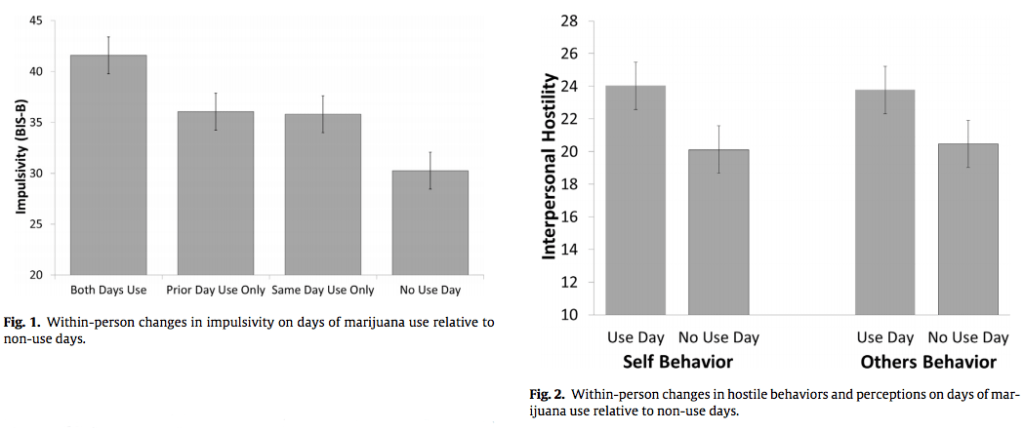English
In a December 2014 study examining the effects after marijuana use on “impulsivity and hostility in everyday life”, researchers from the Department of Psychiatry at Yale University School of Medicine and the Department of Psychology at Penn State University collaborated to better understand whether cannabis use affects users’ everyday experiences. They sought 43 participants without substance dependence and asked them to report on their alcohol, tobacco and recreational cannabis use, impulsivity and interpersonal hostility during a 14-day period. Participants were a mix of men and women who had previously used cannabis and drank alcohol at least once a week. They were not substance dependent and were not using substances other than cannabis, alcohol or nicotine. After a telephone screening and an initial interview, they performed a carbon monoxide test and gave urine samples. They were then trained on how to complete a daily assessment.
Each night, participants were asked to measure the following information:
- Daily alcohol, tobacco and cannabis use (how many drinks were consumed, how many cigarettes or cigars were consumed and how many “puffs” of cannabis were consumed and the type of use).
- Daily impulsivity, assessed by a 7 item brief survey using the Barratt Impulsiveness Scale-Brief.
- Daily interpersonal hostility in the form of a survey every time a person had an interpersonal interaction that lasted longer than five minutes
The data showed that impulsivity increased on days when cannabis was used compared to days when it was not used, and interpersonal hostility also increased on days of use.
This is evident from the results of the study:
“Our findings support a directional effect of marijuana use on increases in next day impulsivity, a result not previously described in the literature. This is consistent with prior research findings that occasional users of marijuana experience stronger effects of marijuana on attention and inhibition relative to chronic users (Theunissen et al., 2012).”
What is the scientific basis for this conclusion? The researchers are also investigating this question:
“Laboratory studies have found that individuals under the influence of marijuana displayed systematic changes in interpersonal behavior and experience, including a pattern of interpersonal withdrawal, hostility, and diminished interpersonal skills. Despite subjective reports of enhanced sensation and perception, individuals under acute administration of THC showed objective decreases in the number of interpersonal interactions engaged in and the expression of empathetic communications. This suggests that marijuana use has a significant impact on interpersonal behaviors, of which users are not aware. Additional research has found social-emotional deficits in marijuana users, and increases in hostility or aggression.”
The study reports that chronic cannabis users show deactivation of the anterior cingulate cortex (ACC) and amygdala in response to the unconscious presentation of emotional faces, compared to a control group showing increased activation. The ACC plays a role in error monitoring, behavioural correction and inhibition in response to contextual or environmental changes, so deactivation of the ACC and amygdala could manifest as inappropriate interpersonal responses or altered perceptions of interpersonal behaviour in others. In other words, chronic use can disable the part of your brain that keeps your grumpy-face response in check. So what’s the downside to being a grumpypus? Well, according to researchers, impulsivity is associated with a higher risk of mental illness, addiction and risky behaviour, while hostility can be linked to cardiovascular risk, stress-related health disorders, disrupted intimacy and other aggressive behaviours.
The implausibility of studies on the hostility after marijuana.
The study is not without its flaws. The sample size is incredibly small, and the researchers failed to find any effects of alcohol consumption on impulsivity or hostility, despite citing previous studies that found such effects (to be fair, another study was cited that also found no effects of alcohol on risk-taking behaviour, although five minutes on YouTube should lend credence to the idea that alcohol and risk-taking behaviour are often linked). Second, the researchers acknowledged that asking participants to rate their own behaviour may have fostered a level of self-awareness that subsequently affects either interpersonal behaviour or behaviour rating and that future research should investigate whether self-observation of interpersonal behaviour leads to differences in actual behaviour. In other words, participants may have been overly self-critical, knowing that they had to record their daily behaviour for this study. First, the primary predictor for the researchers was whether their subjects reported any cannabis use compared to specific doses, which we know can vary widely.
Finally, and perhaps most amusingly, respondents may have been intoxicated when filling out the questionnaires, which could have biased responses for same-day effects. Future research should investigate whether the level of intoxication alters these effects. Translation: our subjects could have been super drunk or super stoned or both, so their self-reported data could be biased. So you’re hostile after marijuana? According to this study, yes, but as with all cannabis results, more research is needed as the limited number of studies that exist can only tell us part of the story. This is another reason why we need more research so that we can test, re-test and test some more until we are able to draw more reliable conclusions. Re-regulating the licensing of cannabis would be a big step in the right direction because it would open up more research opportunities.
Related articles :

Published by Sakul
23/02/2023choose and buy cannabis seeds from our offer
our pleasure




























